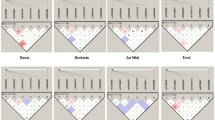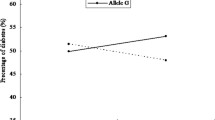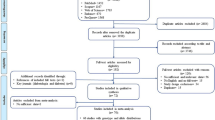Abstract
The recent observations that Peroxisome proliferator activated receptor gamma coactivator 1 alpha (PGC1A) is responsible for the induction of reactive oxygen species (ROS) detoxifying agents and that ROS triggers insulin resistance, support the role that this gene could play in the onset of Type 2 diabetes mellitus (T2DM). Two PGC1A variants Thr394Thr (rs2970847) and Gly482Ser (rs8192673) were genotyped in 822 subjects (351 T2DM cases and 471 controls) from two North Indian populations, represented as Group 1 (Kashmir population) and Group 2 (Punjab and Jammu population). Both Groups 1 and 2 showed a significant association of Thr394Thr variant with T2DM after applying Bonferroni corrections (P = 0.001 and 0.012, respectively). Logistic regression analysis for Thr394Thr susceptible genotypes together (rs2970847 G/A and A/A) conferred a 1.89-(95%CI 1.25–2.85) fold higher risk for T2DM in Group 1 and 1.81-(95%CI 1.19–2.78) fold risk in Group 2. The susceptible, Ser482 (rs8192673 G/A and A/A) genotypes, gave a 2.04 (95%CI 1.47–3.03) fold higher risk for T2DM in Group 1. Mitochondrial genotype backgrounds observed in association with T2DM (Bhat et al. 2007), when studied in combination with PGC1A variants, showed an increased prevalence in controls with mt10398G and 16189T along with G/G genotype background at the two polymorphic loci of PGC1A. These observations suggest that the two genotype backgrounds together could provide protection against T2DM.
Similar content being viewed by others
References
Alhopuro P, Katajisto P, Lehtonen R, Ylisaukko-Oja SK, Naatsaari L, Karhu A, Westerman AM, Wilson JH, de Rooij FW, Vogel T, Moeslein G, Tomlinson IP, Aaltonen LA, Makela TP, Launonen V (2005) Mutation analysis of three genes encoding novel LKB1–interacting proteins, BRG1, STRADalpha, and MO25alpha, in Peutz-Jeghers syndrome. Br J Cancer 92:1126–1129
Baier LJ, Permana PA, Yang X, Pratley RE, Hanson RL, Shen GQ, Mott D, Knowler WC, Cox NJ, Horikawa Y, Oda N, Bell GI, Bogardus C (2000) A calpain-10 gene polymorphism is associated with reduced muscle mRNA levels and insulin resistance. J Clin Invest 106:R69–R73
Barroso I, Luan J, Sandhu MS, Franks PW, Crowley V, Schafer AJ, O’Rahilly S, Wareham NJ (2006) Meta-analysis of the Gly482Ser variant in PPARGC1A in type 2 diabetes and related phenotypes. Diabetologia 49:501–505
Bhat A, Koul A, Sharma S, Rai E, Bukhari SI, Dhar MK, Bamezai RN (2007) The possible role of 10398A and 16189C mtDNA variants in providing susceptibility toT2DM in two North Indian populations: a replicative study. Hum Genet 120:821–826
Choi YS, Hong JM, Lim S, Ko KS, Pak YK (2006) Impaired coactivator activity of the Gly482 variant of peroxisome proliferator-activated receptor gamma coactivator-1alpha (PGC-1alpha) on mitochondrial transcription factor A (Tfam) promoter. Biochem Biophys Res Commun 344:708–712
Cui L, Jeong H, Borovecki F, Parkhurst CN, Tanese N, Krainc D (2006) Transcriptional repression of PGC-1alpha by mutant huntingtin leads to mitochondrial dysfunction and neurodegeneration. Cell 127:59–69
Darvishi K, Sharma S, Bhat AK, Rai E, Bamezai RN (2007) Mitochondrial DNA G10398A polymorphism imparts maternal Haplogroup N a risk for breast and esophageal cancer. Cancer Lett doi:10.1016/j.canlet.2006.09.005
Ek J, Andersen G, Urhammer SA, Gaede PH, Drivsholm T, Borch-Johnsen K, Hansen T, Pedersen O (2001) Mutation analysis of peroxisome proliferator-activated receptor-gamma coactivator-1 (PGC-1) and relationships of identified amino acid polymorphisms to Type II diabetes mellitus. Diabetologia 44:2220–2226
Fanelli M, Filippi E, Sentinelli F, Romeo S, Fallarino M, Buzzetti R, Leonetti F, Baroni MG (2005) The Gly482Ser missense mutation of the Peroxisome Proliferator-activated receptor gamma coactivator-1alpha (PGC-1alpha) gene associates with reduced insulin sensitivity in normal and glucose-intolerant obese subjects. Dis Markers 21:175–180
Fernandez-Cadenas I, Andreu AL, Gamez J, Gonzalo R, Martin MA, Rubio JC, Arenas J (2003) Splicing mosaic of the myophosphorylase gene due to a silent mutation in McArdle disease. Neurology 61:1432–1434
Hara K, Tobe K, Okada T, Kadowaki H, Akanuma Y, Ito C, Kimura S, Kadowaki T (2002) A genetic variation in the PGC-1 gene could confer insulin resistance and susceptibility to T2DM. Diabetologia 45:740–743
Houstis N, Rosen ED, Lander ES (2006) Reactive oxygen species have a causal role in multiple forms of insulin resistance. Nature 440:944–948
Lacquemant C, Chikri M, Boutin P, Samson C, Froguel P (2002) No association between the G482S polymorphism of the proliferator-activated receptor-gamma coactivator-1 (PGC-1) gene and T2DM in French Caucasians. Diabetologia 45:602–603
Leipold H, Knoefler M, Gruber C, Huber A, Haslinger P, Worda C (2006) Peroxisome proliferator-activated receptor gamma coactivator-1alpha gene variations are not associated with gestational diabetes mellitus. J Soc Gynecol Investig 13:104–107
Louet JF, Hayhurst G, Gonzalez FJ, Girard J, Decaux JF (2002) The coactivator PGC-1 is involved in the regulation of the liver carnitine palmitoyltransferase I gene expression by cAMP in combination with HNF4 alpha and cAMP-response element-binding protein (CREB). J Biol Chem 277:37991–38000
Michael LF, Wu Z, Cheatham RB Puigserver P, Adelmant G, Lehman JJ, Kelly DP, Spiegelman BM (2001) Restoration of insulin-sensitive glucose transporter (GLUT4) gene expression in muscle cells by the transcriptional coactivator PGC-1. Proc Natl Acad Sci USA 98:3820–3825
Monsalve M, Wu Z, Adelmant G, Puigserver P, Fan M, Spiegelman BM (2000) Direct coupling of transcription and mRNA processing through the thermogenic coactivator PGC-1. Mol Cell 6:307–316
Oberkofler H, Klein K, Felder TK, Krempler F, Patsch W (2006) Role of peroxisome proliferator-activated receptor-gamma coactivator-1alpha in the transcriptional regulation of the human uncoupling protein 2 gene in INS-1E cells. Endocrinology 147:966–976
Puigserver P, Wu Z, Park CW, Graves R, Wright M, Spiegelman BM (1998) A cold-inducible coactivator of nuclear receptors linked to adaptive thermogenesis. Cell 92:829–839
Ross OA, McCormack R, Curran MD, Duguid RA, Barnett YA, Rea IM, Middleton D (2001) Mitochondrial DNA polymorphism: its role in longevity of the Irish population. Exp Gerontol 36:1161–1178
St-Pierre J, Drori S, Uldry M, Silvaggi JM, Rhee J, Jager S, Handschin C, Zheng K, Lin J, Yang W, Simon DK, Bachoo R, Spiegelman BM (2006) Suppression of reactive oxygen species and neurodegeneration by the PGC-1 transcriptional coactivators. Cell 127:397–408
Vimaleswaran KS, Radha V, Ghosh S, Majumder PP, Deepa R, Babu HN, Rao MR, Deepa R, Babu HN, Rao MR (2005) Peroxisome proliferator-activated receptor-gamma co-activator-1alpha (PGC-1alpha) gene polymorphisms and their relationship to Type 2 diabetes in Asian Indians. Diabet Med 22:1516–1521
Vohl MC, Houde A, Lebel S, Hould FS, Marceau P (2005) Effects of the peroxisome proliferator-activated receptor-gamma co-activator-1 Gly482Ser variant on features of the metabolic syndrome. Mol Genet Metab 86:300–306
Wild S, Roglic G, Green A, Sicree R, King H (2004) Global prevalence of diabetes: estimates for the year 2000 and projections for 2030. Diabetes Care 27:1047–1053
Yoon JC, Puigserver P, Chen G, Donovan J, Wu Z, Rhee J, Adelmant G, Stafford J, Kahn CR, Granner DK, Newgard CB, Spiegelman BM (2001) Control of hepatic gluconeogenesis through the transcriptional coactivator PGC-1. Nature 413:131–138
Yoon JC, Xu G, Deeney JT, Yang SN, Rhee J, Puigserver P, Levens AR, Yang R, Zhang CY, Lowell BB, Berggren PO, Newgard CB, Bonner-Weir S, Weir G, Spiegelman BM (2003) Suppression of beta cell energy metabolism and insulin release by PGC-1alpha. Dev Cell 5:73–83
Zhang CY, Baffy G, Perret P, Krauss S, Peroni O, Grujic D, Hagen T, Vidal-Puig AJ, Boss O, Kim YB, Zheng XX, Wheeler MB, Shulman GI, Chan CB, Lowell BB (2001) Uncoupling protein-2 negatively regulates insulin secretion and is a major link between obesity, beta cell dysfunction, and type 2 diabetes. Cell 105:745–755
Acknowledgments
The authors acknowledge the support provided by UGC, India to NCAHG and to the Centre for Advanced Studies, School of Life Sciences, JNU. Authors appreciate the critical reading done by Dr. Dheeraj Malhotra and the suggestions given. The fellowship of CSIR to A. Bhat, A. Koul, S. Sharma, and of UGC to E. Rai is also acknowledged.
Author information
Authors and Affiliations
Corresponding author
Additional information
An erratum to this article is available at http://dx.doi.org/10.1007/s00439-008-0464-1.
Electronic supplementary material
Below is the link to the electronic supplementary material.
Rights and permissions
About this article
Cite this article
Bhat, A., Koul, A., Rai, E. et al. PGC-1α Thr394Thr and Gly482Ser variants are significantly associated with T2DM in two North Indian populations: a replicate case-control study. Hum Genet 121, 609–614 (2007). https://doi.org/10.1007/s00439-007-0352-0
Received:
Accepted:
Published:
Issue Date:
DOI: https://doi.org/10.1007/s00439-007-0352-0




